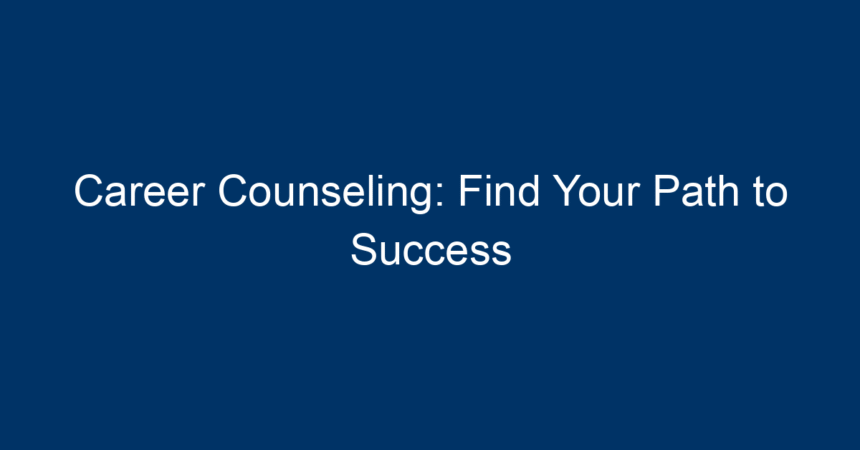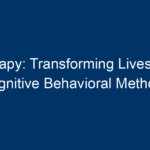Navigating the world of careers can feel overwhelming, especially with the multitude of choices available today. Whether you’re a recent graduate, someone looking to change careers, or simply questioning your current trajectory, career counseling can provide you with the insights and clarity needed to take the next steps toward success. In this article, we’ll explore what career counseling is, its benefits, the process involved, and how to choose the right counselor for your unique needs.
What is Career Counseling?
Career counseling is a professional service aimed at helping individuals understand themselves better in relation to their career choices. It encompasses a range of activities designed to enhance self-awareness, develop decision-making skills, and create a strategic plan for future career development. By assessing your skills, interests, and values, a trained counselor can guide you in identifying potential career paths that align with your aspirations.
Why is Career Counseling Important?
In an ever-evolving job market, gaining clarity on your career path is essential. Here are some key reasons why career counseling is important:
- Personalized Guidance: Career counselors provide tailored advice that considers your unique experiences, strengths, and limitations.
- Skill Assessment: Many counselors conduct assessments to measure your competencies and interests, helping you discover where you may excel.
- Exploration of Alternatives: Just because you studied one subject doesn’t mean you must stick to it. Career counseling can reveal new opportunities you hadn’t previously considered.
- Confidence Building: Engaging with a counselor can help reinforce your skills and build confidence in your choices.
The Benefits of Career Counseling
Career counseling offers numerous advantages that can significantly impact your career journey. Here are some of the notable benefits:
1. Self-Discovery
Understanding your own strengths, weaknesses, values, and interests is crucial in making informed career decisions. Career counseling often includes personal assessments that help you gain insights into who you are and what you really want from your career.
2. Informed Decision-Making
With the guidance of a career counselor, you can evaluate various career options based on your own criteria. Rather than relying on external opinions or societal expectations, you can make informed decisions aligned with what you truly want.
3. Networking Opportunities
Many career counselors have connections in various industries and can introduce you to professionals in your desired field. Networking is often a key component in career progression, making this an invaluable benefit.
4. Resume and Interview Preparation
Professional career counselors can assist you in refining your resume and preparing for interviews. This includes not only ensuring your documents are polished but also practicing interview techniques specific to your target industry.
5. Ongoing Support
Choosing a career path is not a one-time decision; it’s a continuous journey. Many career counseling services offer follow-up sessions and support to help you adapt as you grow and change.
The Career Counseling Process
Understanding the steps involved in career counseling can help you know what to expect. Here’s a breakdown of the typical process:
Step 1: Initial Assessment
The first step usually involves an initial consultation to evaluate your career goals and concerns. During this session, you’ll discuss your background and any specific areas you wish to focus on.
Step 2: Skills and Interest Assessments
Counselors often use various tools and assessments to gather more data about your skills and interests. These may include personality tests, interest inventories, and skills assessments that can provide a comprehensive understanding of your capabilities.
Step 3: Exploration
After gathering the necessary information, your counselor will help you explore various career options that align with your interests and skills. This may include job shadowing, informational interviews, and researching potential career paths.
Step 4: Goal Setting
Once you have explored various avenues, you’ll work with your counselor to set specific, achievable goals. These goals should align with both your personal aspirations and market demands.
Step 5: Action Plan
In this phase, you’ll develop a clear action plan that outlines the steps you need to take to achieve your career goals. This might include pursuing further education or training, applying for jobs, or enhancing your networking skills.
Step 6: Follow-Up
Many counselors offer follow-up sessions to review your progress and adjust your action plan as needed. Continuous support ensures that you stay on track as you navigate the dynamic job market.
How to Choose the Right Career Counselor
Choosing the right career counselor is crucial for your success. Here are some factors to consider:
1. Qualifications and Experience
Look for counselors who have relevant credentials and experience in career counseling. Their education and background should indicate a strong understanding of various industries.
2. Specialization
Some counselors specialize in certain fields or demographics (e.g., students, veterans, executives). Ensure that the counselor you choose understands your specific situation and career goals.
3. Approachability
You want a counselor with whom you feel comfortable discussing personal matters. A good rapport will enhance your experience and the effectiveness of the counseling process.
4. Reviews and Recommendations
Seek out reviews or testimonials from previous clients. Word-of-mouth recommendations can be incredibly beneficial in finding a counselor who meets your needs.
5. Cost
Career counseling services can vary in cost. Investigate what’s included in the fee and whether any financial assistance options are available.
Actionable Insights
As you explore career counseling, consider these actionable steps:
-
Research Potential Counselors: Take the time to research local and online options. Check their qualifications and reviews to ensure you find the right match.
-
Evaluate Your Goals: Before your first session, take some time to reflect on what you hope to achieve through counseling.
-
Be Open-Minded: Keep an open mind when discussing potential career paths. You might uncover interests you had never considered.
-
Follow Through: Commitment is essential. Create a timeline for your goals and check in with your counselor regularly to assess your progress.
- Stay Informed: Career trends change regularly. Stay up-to-date with market demands and integrate this knowledge into your counseling sessions.
Conclusion
Career counseling can serve as a guiding light on your path to professional success. By understanding your strengths and exploring various career options, you can make informed decisions that align with your aspirations. Remember, the journey to find your ideal career is personal and unique to you. With the right guidance, support, and commitment, you can confidently navigate the complexities of today’s job market. Take that step—invest in career counseling and set yourself on a path toward a fulfilling and successful career.




